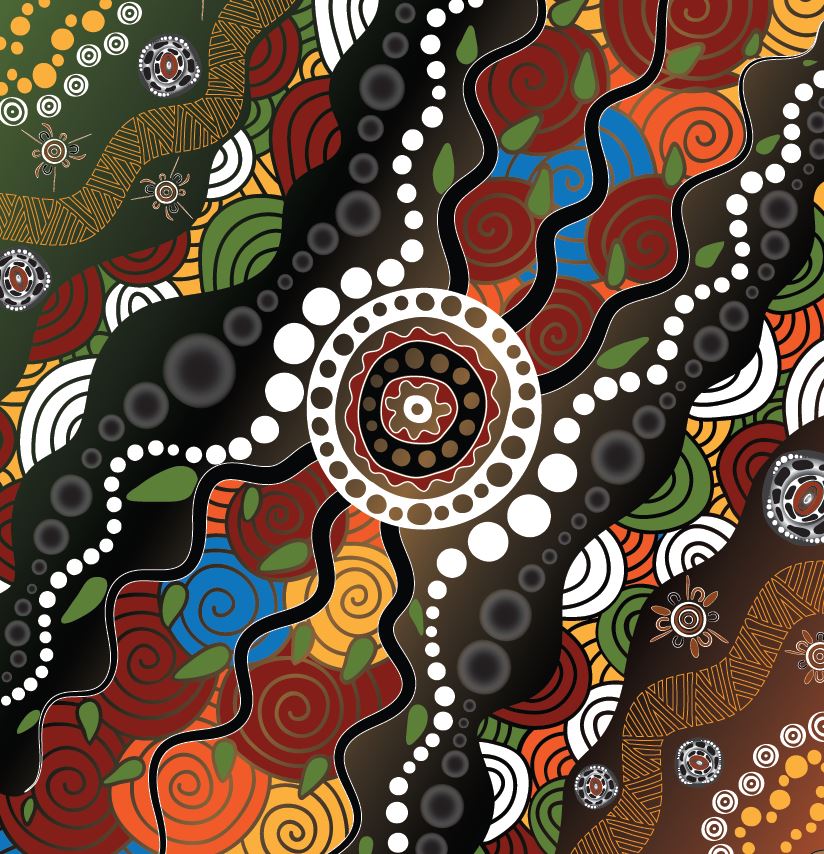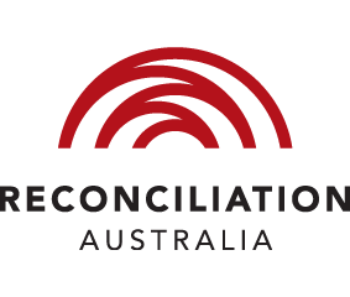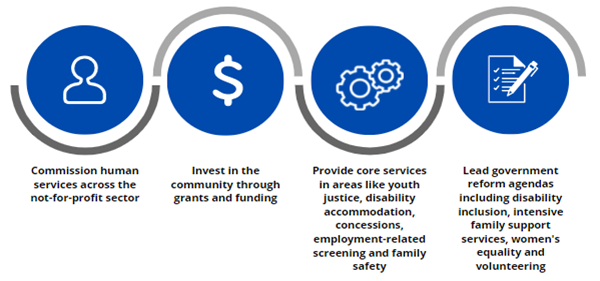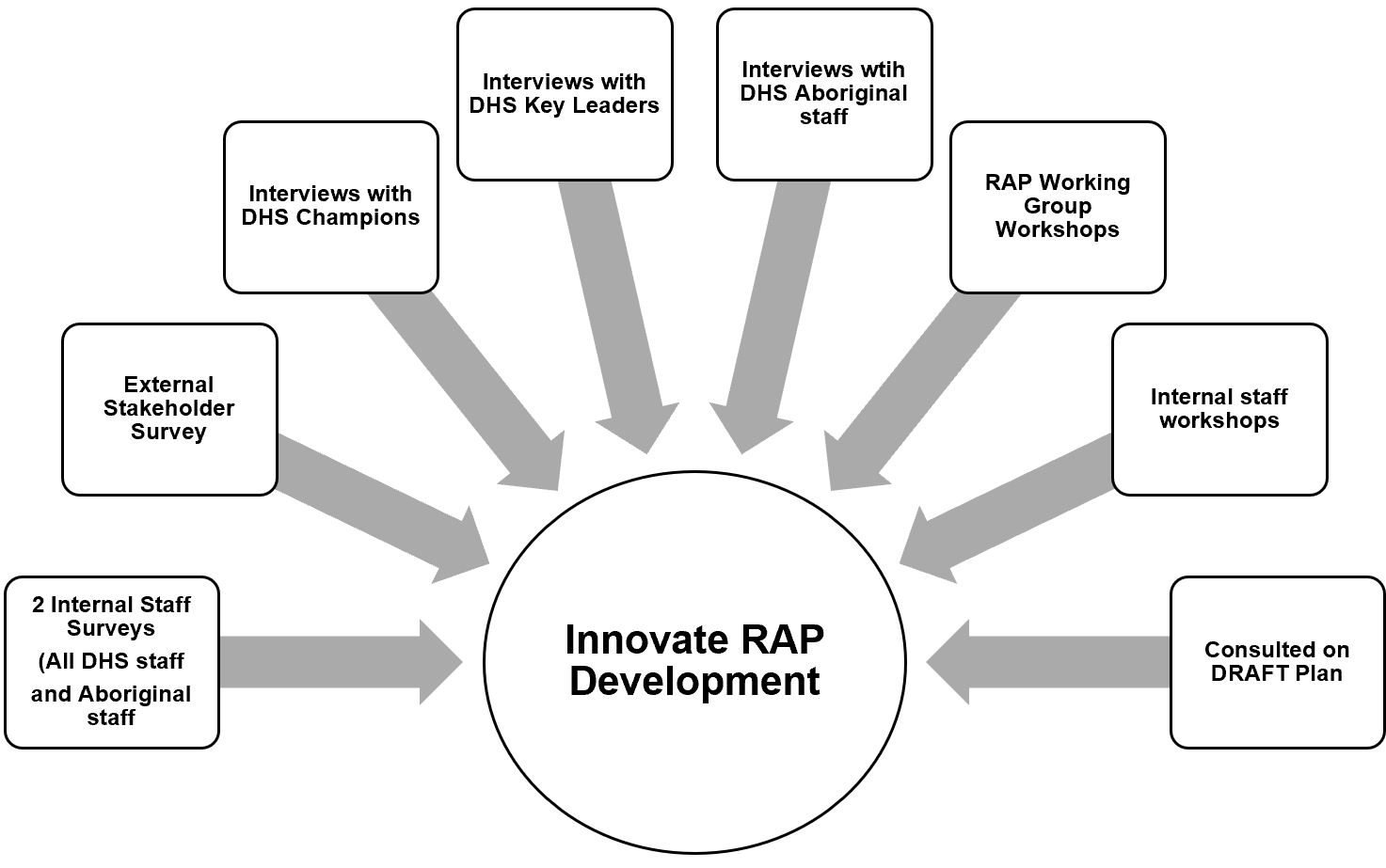2022 to to 2024 Plan
Background
Acknowledgement of Country
We, the Department of Human Services (DHS), acknowledge and respect Aboriginal peoples as South Australia’s First Peoples and the Traditional Owners and occupants of the lands and waters of South Australia. We respect and celebrate the varied cultural and spiritual identities of all Aboriginal and Torres Strait Islander communities.
Aboriginal and Torres Strait Islander peoples have the right to live free from discrimination of any kind, and to exercise and enjoy their rights to family and culture in accordance with the principles of the United Nations Declaration of the Rights of Indigenous Peoples.
We are committed to ensuring that the voices, aspirations and needs of Aboriginal and Torres Strait Islander peoples are reflected in our Innovate Reconciliation Action Plan (RAP) and will work in partnership with Aboriginal and Torres Strait Islander peoples to develop, monitor and evaluate deliverable actions.
Our Plan Artwork

'Cultural Maintenance' by Allan Sumner
The above artwork "Cultural Maintenance' was commissioned by the Department, from Alan Sumner, a descendent of the Ngarrindjeri, Kaurna, and Yankunytjatjara people to represent the department's vision for reconciliation, as outlined in this plan.
The artwork is a fusion of symbols that reflect the ways in which the Department serves the people and communities of South Australia. It visually pieces together these symbols, in waveform, to represent the cohesion and connectedness within the Department.
Explanation | Artwork Symbols | ||
| Symbol | Element | Meaning |
|---|---|---|

| Protection | This symbol represents sand. The same way sand naturally protects against erosion we must also protect and maintain our cultures, languages and values. |

| Growth and Self-development | This symbol represents a living tree that is being sustained by water. Like the tree, DHS provides opportunity for personal growth and self-development. |

| Accountability | Two journey lines represent Aboriginal Elders who are responsible for teaching our young ones, and leading them on the right path. Their approach may not be the same, but their message is consistent. |

| Innovation | This symbol represents a tree root growing under the ground, and winding its way around obstacles on its journey, creating new paths as it grows bigger and stronger. |

| Support | This symbol represents gathering sites; places where support is offered to families and communities that is culturally safe. |

| Collaboration | A woven pattern found in traditional basket weaving represents working together for a strong, collective solution. The strands weave together, forming a robust, functional basket. |
 | Sustainability | This symbol represents water and fresh water springs representing the flow of life, renewal and how water sustains life in cycles spanning generations. |
 | Inclusiveness | This symbol represents the coming together of health professionals, providing collaborative opportunities for people to learn about health issues for Aboriginal peoples. |
 | Culture | Aboriginal identity being is our culture — it is our home and our comfort, our safe place. This symbol represents that shelter and the cultural collective of Aboriginal community groups across South Australia. |
 | Men/women Teaching Families | Teaching young people and passing on First Nations knowledge. |
Message from the Chief Executive, DHS
Reconciliation is everyone’s business and everybody’s responsibility. Here at the Department of Human Services (DHS) we take this commitment very seriously, which is why I am incredibly proud to introduce our 2022 DHS Innovate Reconciliation Action Plan (RAP).
The traditional practices and cultures of Aboriginal and Torres Strait Islander peoples are the oldest in the world and this is something we acknowledge and celebrate at DHS. We are proud of our Aboriginal and Torres Strait Islander histories, cultures and respect this by working alongside and learning from the wisdom and insight of our Aboriginal and Torres Strait Islander colleagues, clients and communities.
Our RAP paves the way for us all to make reconciliation a real part of the work we do each day. As a department we are committed to fairness, opportunity and choice for all South Australians. This means we need to be on the front foot in walking the path towards true reconciliation — where Aboriginal and Torres Strait Islander and non-Indigenous peoples work together to make a real difference in the lives of Aboriginal and Torres Strait Islander families and communities.
True reconciliation requires truth telling, including acknowledging the historical and ongoing impacts of colonisation. It also requires a commitment to listening deeply, building cultural intelligence, celebrating diversity and having the humility to recognise and value different ways of being and doing. Reconciliation will only come via compassionate cooperation between Aboriginal and Torres Strait Islander and non-Indigenous peoples, wherein non-Indigenous allies take up their responsibility as champions for racial justice. Reconciliation is a commitment to justice. For us at DHS, this also means delivering on our promises. This Innovate RAP commits us to important steps forward, including increasing Aboriginal and Torres Strait Islander employment in our workplace, delivering a tailored cultural training program for all staff, co-designing an Aboriginal and Torres Strait Islander engagement strategy, and implementing an effective anti-racism campaign.
I’m excited to be part of an organisation that works hard to ensure it provides a culturally safe place for Aboriginal and Torres Strait Islander peoples to work and access services, whilst encouraging an environment where all staff can acknowledge and celebrate the incredibly diverse cultures of Aboriginal and Torres Strait Islander peoples and their communities.
Many thanks to our Reconciliation Committee for driving the development of this Innovate RAP, the staff that have contributed to the process through surveys and feedback and Reconciliation SA for their support and guidance.
Lois Boswell
Chief Executive
Department of Human Services
Statement from the Chief Executive Officer, Reconciliation Australia

Reconciliation Australia commends Department of Human Services (SA) on the formal endorsement of its second Innovate Reconciliation Action Plan (RAP).
Since 2006, RAPs have provided a framework for organisations to leverage their structures and diverse spheres of influence to support the national reconciliation movement.
With close to 3 million people now either working or studying in an organisation with a RAP, the program’s potential for impact is greater than ever. Department of Human Services continues to be part of a strong network of more than 1,100 corporate, government, and not-for-profit organisations that have taken goodwill and transformed it into action.
The four RAP types — Reflect, Innovate, Stretch and Elevate — allow RAP partners to continuously strengthen reconciliation commitments and constantly strive to apply learnings in new ways.
An Innovate RAP is a crucial and rewarding period in an organisation’s reconciliation journey. It is a time to build the strong foundations and relationships that ensure sustainable, thoughtful, and impactful RAP outcomes into the future.
An integral part of building these foundations is reflecting on and cataloguing the successes and challenges of previous RAPs. Learnings gained through effort and innovation are invaluable resources that Department of Human Services will continuously draw upon to create RAP commitments rooted in experience and maturity.
These learnings extend to Department of Human Services using the lens of reconciliation to better understand its core business, sphere of influence, and diverse community of staff and stakeholders.
The RAP program’s emphasis on relationships, respect, and opportunities gives organisations a framework from which to foster connections with Aboriginal and Torres Strait Islander peoples rooted in mutual collaboration and trust.
This Innovate RAP is an opportunity for Department of Human Services to strengthen these relationships, gain crucial experience, and nurture connections that will become the lifeblood of its future RAP commitments. By enabling and empowering staff to contribute to this process, Department of Human Services will ensure shared and cooperative success in the long-term.
Gaining experience and reflecting on pertinent learnings will ensure the sustainability of Department of Human Services’ future RAPs and reconciliation initiatives, providing meaningful impact toward Australia’s reconciliation journey.
Congratulations Department of Human Services on your second Innovate RAP and I look forward to following your ongoing reconciliation journey.
Karen Mundine
Chief Executive Officer
Reconciliation Australia
Our Vision for Reconciliation
At DHS, we are uniquely positioned to build strong relationships with Aboriginal and Torres Strait Islander communities and stakeholders and lead by example within the State Government as a reconciliation ally, leader and role model.
Our Vision is for reconciliation to be a core organisational value that guides our strategies, programs and services. We will ensure that through collaboration and inclusion, Aboriginal and Torres Strait Islander peoples who engage with our services are recognised, respected and receive the highest quality of service that is appropriate to their needs.
We will:
- lift the voices and experiences of Aboriginal and Torres Strait Islander peoples and communities
- work closely in an authentic process of collaboration and agreement-making
- support Aboriginal and Torres Strait Islander self-determination.
Our Business
The Department of Human Services (DHS) brings together a range of services, funding and policy responsibilities which together support fairness, opportunity and choice for all South Australians.
DHS has lead responsibility on behalf of the South Australian government in the areas of:
- early intervention to support health
- disability
- domestic violence
- safety and wellbeing of children
- screening services
- youth justice.
The department also provides a wide range of grants to community organisations, and concessions and has lead policy responsibility in relation to women, young people and volunteers.
We are one of the largest South Australian Government departments, hosting an employment pool of over 3000 staff (of whom 3% identify as Aboriginal and/or Torres Strait Islander people) across metropolitan, regional and remote areas of South Australia.
We partner with community to develop policy, programs and services to strengthen communities and enable South Australians to actively participate in community life. We ensure South Australians are safe, empowered and connected to their communities through strength-based programs and services. We focus on supporting positive and lasting outcomes by adapting our services to reflect the changing needs of South Australians. This is all undertaken in a collaborative effort within our sphere of influence from vulnerable South Australians we exist to serve, DHS employees and volunteers to external government and non-government agencies.
Our services span the entirety of South Australia, from Kaurna Country in the state’s capital of Adelaide to the many regional and rural communities that make up our great state. This involves working alongside small and large Aboriginal and Torres Strait Islander communities across South Australia, including the Anangu Pitjantjatjara Yankunytjatjara Lands (APY) in the north-west of the state.
We will:
- Commission human services across the not-for-profit sector.
- Invest in their community through grants and funding.
- Provide core services in areas like youth justice, disability accommodation, concessions, employment- related screening and family safety.
- Lead government reform agendas including disability inclusion, intensive family support services, women's equality and volunteering.

Our Reconciliation Action Plan Journey
We acknowledge that words and intentions alone will not achieve the outcomes required for genuine reconciliation. Reconciliation is a process of strengthening relationships between Aboriginal and Torres Strait Islander peoples and other Australians, for the benefit of all. This journey at DHS began more than 10 years ago and will continue through an ongoing and ever-evolving process of listening, learning and engaging with the South Australian Aboriginal and Torres Strait Islander communities.
Although we have undergone much change within our organisation, we acknowledge that awareness and understanding of reconciliation has not been as consistent as we would like and there is still much, we can learn and do. Our staff have told us that:
reconciliation is not sufficiently seen as everyone’s business
racism, discrimination, unconscious bias, and resistance to reconciliation remain key issues to address
there is a lack of career progression opportunities for Aboriginal and Torres Strait Islander peoples, leading to few Aboriginal and Torres Strait Islander staff in leadership positions.
We still have a journey ahead of us and have sought to re-invest in our organisation’s reconciliation journey by fully engaging in the Innovate RAP process.
Our achievements so far include:
- developing and commencing our Aboriginal Workforce Strategy 2021–2023, to deliver real improvements in supporting the recruitment, retention and development of Aboriginal and Torres Strait Islander employees
- committing to increase our percentage of Aboriginal and Torres Strait Islander staff from 3% (as of February 2021) to 4.0%
- spending more than $10 million on engaging Aboriginal and Torres Strait Islander businesses
- embedding Aboriginal and Torres Strait Islander community engagement principles into the delivery of our services
- organising more than five National Reconciliation Week events and seven NAIDOC Week events each year.
Case Study 1: NAIDOC Week Event
*Please note, the name of a deceased Aboriginal person is present in this message*
Between 5 July 2021 and 9 July 2021, our staff came together to see, hear and learn about the history of our country and the importance Aboriginal and Torres Strait Islander peoples place on family, kin, law, lore, ceremony, traditions and language. Many staff took the time during the five days of activities to consider NAIDOC Week’s theme of ‘Heal Country’.
Our celebrations began with a Welcome to Country led by Mr Issac Hannam, a Ngarrindjeri and Kaurna man, who played the didgeridoo for staff as they entered the Riverside Building on North Terrace. Our staff then enjoyed a morning tea of Aboriginal delicacies and engaged in activities to design their own personalised Acknowledgement of Country — a sign of respect for the land, the people and the water upon which we meet and work.
The completion of the Aboriginal artwork in the Stephen Goldsmith Education Centre in Riverside Centre was a special moment for our staff.
On stepping into the Education Centre in the Riverside building, we are now welcomed with Gadlabarti — a collaborative work between Ngarrindjeri artist Thomas Readett and Pitjantjatjara and Yankunytjatjara artist Elizabeth Close. The painting features Uncle Stephen’s totem, Gadlabarti; the Native Red-Eyed Resin Bee.
Some of the highlights throughout NAIDOC Week included:
- panel discussions on what ‘healing country’ means to Aboriginal and Torres Strait Islander peoples; having a reciprocal relationship with country, caring for country, traditional healing and how non-Indigenous people can be active allies.
- Kaurna Tjilbruke Dreaming Story NAIDOC Week event, which took our staff to Kingston Park Coastal Reserve where they were joined by respected Elder Uncle Rod O’Brien, Adelaide University Kaurna Cultural Adviser and former DHS Youth Justice worker.
- Aboriginal and Torres Strait Islander histories of Pinky Flat by Aunty Yvonne who shared her stories about the conflict between Aboriginal and Torres Strait Islander peoples and non-Indigenous settlers, and spoke of her childhood, where she grew up in a multicultural neighbourhood of Adelaide in Waymouth Street, and her education at the Sturt Street School.
Our NAIDOC Week celebrations encouraged rich discussion and reflection and we are committed to our ongoing learning journey.
Case study 2: Aboriginal Workforce Strategy 2021–2023
We want to work to ensure that Aboriginal and Torres Strait Islander peoples enjoy the same levels of prosperity or outcomes in health, education and employment as non-Indigenous peoples and it is incumbent on those who can effect positive change for Aboriginal and Torres Strait Islander peoples to do so.
Our first Aboriginal Employment Strategy 2014–2016 built on the considerable work done across the Department to recruit and retain Aboriginal and Torres Strait Islander peoples with evidence showing us that achieving sustained improvement across a range of indicators in education, employment, health and justice required significant Aboriginal and Torres Strait Islander peoples’ economic participation.
From 2017, the Aboriginal Employment Strategy was combined into the Diversity and Inclusion Strategy 2017–2019, the first of its kind across the South Australian public sector to progress and enhance the many employment-related initiatives already in train across various areas of the department.
We are committed to employing more Aboriginal and Torres Strait Islander staff, retaining and upskilling current Aboriginal and Torres Strait Islander staff and creating a culturally safe working environment to make our department an employer of choice for Aboriginal and Torres Strait Islander peoples. That is why a standalone Aboriginal Workforce Strategy was considered essential if we were to meet our targets.
The Aboriginal Workforce Strategy 2021–2023 goes far in ensuring we consistently monitor and achieve our desired outcomes; for 4% of our total workforce to be Aboriginal and/or Torres Strait Islander identified by the end of 2023 and a continued improvement year on year thereafter.
Our Learnings
Our reconciliation journey has taught us some valuable lessons.
Reconciliation requires collective action.
Our work extends across South Australia and this has given us great opportunity to connect with many different people, communities and organisations. We have found that it is only by working together and having a shared vision that we can truly make a difference.
We must be accountable for our commitment to reconciliation.
Our successes and challenges are important parts of our reconciliation journey and our meaningful engagement in this process. As transparent and accountable leaders in reconciliation we must share the entirety of our reconciliation journey with our staff and the community.
Our staff want to be part of our reconciliation journey.
We are motivated to engage meaningfully in the reconciliation process and, we must create more opportunities for all staff to feel included and acknowledge their own learning and growth in this space.
Aboriginal and Torres Strait Islander voice and participation in our services makes us better at what we do.
Our journey so far has shown us that the inclusion of Aboriginal and Torres Strait Islander voices in our work creates better support and services to the South Australian community and our staff.
Our Future
Intention
As we implement our new Innovate RAP, we look towards the next few years to develop new learnings and opportunities. We understand that pursuing reconciliation requires us to recognise and respect Aboriginal and Torres Strait Islander peoples as the oldest living cultures on earth and the Traditional Custodians of the land on which we live and work.
We must acknowledge the truths of historical colonisation and dispossession, and the social and economic inequity that Aboriginal and Torres Strait Islander South Australians continue to experience as a direct result of these events.
To achieve the outcomes of our Innovate RAP and ensure that reconciliation is at the core of our strategic agenda and the driver of our strategic goals, we must be truthful and accept our past.
Our staff want to see meaningful change. We are committed to fulfilling the expectations of our community partners across the state who want to see real action toward reconciliation and to achieving meaningful targets and outcomes that will improve the lives and equality of Aboriginal and Torres Strait Islander peoples in South Australia.
We commit to ensuring our staff will work toward understanding and valuing Aboriginal and Torres Strait Islander cultures, experiences and rights and provide culturally safe workspaces free of racism. We will identify and engage staff in cultural learning experiences and training in cultural sensitivity and intelligence and promote Aboriginal and Torres Strait Islander stories and voices in the workplace.
We will engage and listen to Aboriginal and Torres Strait Islander peak bodies, Aboriginal and Torres Strait Islander community-controlled organisations, non-government organisations, clients and staff. We will work with them to deliver the services they identify as important to Aboriginal and Torres Strait Islander peoples and communities recognising that Aboriginal and Torres Strait Islander peoples hold the answers for Aboriginal and Torres Strait Islander communities.
We will provide guidance and pathways to embed reconciliation and the priorities of Aboriginal and Torres Strait Islander communities in all aspects of our work: our staff, programs, funding, activities, opportunities and partnerships.
Our staff identify reconciliation as a process of acknowledgement, self-reflection, healing, justice, equity and respect. Their vision of a reconciled Australia is one that celebrates and promotes Aboriginal and Torres Strait Islander cultures, and one where Aboriginal and Torres Strait Islander peoples experience the same opportunities and have the same health outcomes as non-Indigenous Australians. Our values of fairness, inclusion, opportunity and choice are uniquely positioned to support the fulfillment of this vision.
Reconciliation requires collective action. Every employee can champion reconciliation and contribute to progress in a meaningful way by taking an active interest in issues important to Aboriginal and Torres Strait Islander peoples; supporting Aboriginal and Torres Strait Islander businesses, industries, programs, services and arts; and by speaking out against racism.
Our Innovate RAP provides us the plan to guide us forward.
Our 2022 Innovate Reconciliation Action Plan
We partnered with Reconciliation SA to review our reconciliation journey to date and undertook an engagement process with our staff and stakeholders across South Australia to determine how best to move forward.
We conducted a number of virtual and face-to-face workshops and surveys with key stakeholders internal and external to our department and interviewed our senior leaders, procurement partnerships and Aboriginal and Torres Strait Islander communities to gain a better understanding of work we do and how it actively contributes to the reconciliation agenda.
Innovate RAP Development
- Two internal staff surveys (all DHS staff and Aboriginal staff).
- External stakeholder survey.
- Interviews with DHS champions.
- Interviews with DHS key leaders.
- Interviews with DHS Aboriginal staff.
- RAP Working Group workshops.
- Internal staff workshops.
- Consulted on draft plan.

Common themes
Some common themes emerged during this consultation process:
- There is a high level of genuine support, understanding and commitment for reconciliation amongst out staff and stakeholders.
- Staff and stakeholders understand the reason for, and champion the development of the DHS Innovate RAP.
- Staff and stakeholders generally feel that we have come a long way in our reconciliation journey over the course of our previous Innovate RAP.
- Although staff generally feel that we have been successful in reconciliation, external stakeholders were less sure.
- The need for people, both internal and external to our department to have more opportunities for direct involvement in reconciliation.
- Efforts to eliminate racism and discrimination towards Aboriginal and Torres Strait Islander staff and stakeholders need to be increased.
- We need to provide more career progression opportunities for Aboriginal and Torres Strait Islander staff within our department.
Our Reconciliation Committee
Central to our commitment to reconciliation was the establishment of the Reconciliation Committee, comprising of employees from each of our divisions. Our Reconciliation Committee, of whom three members identify as Aboriginal and/or Torres Strait Islander people, are the champions of this Innovate RAP and are responsible for monitoring the progress of our actions, along with the Executive Leadership Team (ELT).
Reconciliation Committee members have been encouraged to be curious around the role they play in our journey toward reconciliation. As champions for reconciliation the Committee has been tasked with taking an individual journey to increase their cultural learnings and intelligence under the cultural authority and guidance from our three Aboriginal committee members, and to share this information widely with their colleagues and the community.
Reconciliation Committee members
- Katherine Hawkins (ELT Sponsor)
- Alisa Willis (Chair)
- Liana France (Co-Chair)
- Dale Agius (Inclusion and Reform)
- Fiona Buzzacott (Inclusion and Reform)
- Marek Slabenak (Community and Family Services)
- Alana Buick (Inclusion and Reform)
- Thomas Murphy (Inclusion and Reform)
- Diana Massey (Community and Family Services)
- Poh Li Chew (Community and Family Services)
- Susan Hall (People and Performance)
- Tara Liddy (Community Investment and Support)
- April Smith (Inclusion and Reform)
- Reece Turtur (Inclusion and Reform)
- Kate Melvin (Community and Family Services)
- Brooklyn Ley (Inclusion and Reform)
- Stuart Smith (Disability Services)
- Sarah Smith (Inclusion and Reform)
- Angela Blair (Inclusion and Reform).
Our Plan Champions
For us, reconciliation represents the opportunity for each of us to make personal and professional commitment to righting the wrongs of the past, and addressing current injustices facing Aboriginal people in Australia. This plan sets out a pathway for us engage in truth telling and doing those things that will effect real change.
It’s a path we’re on. We don’t get to choose to walk this path or not. Our path starts with a vital recognition that Australia’s colonial history did many wrongs against Aboriginal people and that these wrongs still echo and impact Aboriginal people today. Many positive steps have been taken on this path, but we have much work to do. This isn’t a simple task, where we will tick a few boxes or say, ‘this isn’t my job’. We all have a role to play to build lasting structures, and to fundamentally question systemically unjust policies and processes. This path centralises and celebrates the sovereignty and strength of Aboriginal people, and a shared goal of measurable equality, equity and unity.
Katherine Hawkins (Executive Leadership Team Sponsor), Alisa Willis (Chair) and Liana France (Co-Chair)
Relationships
Summary
Relationships between Aboriginal and Torres Strait Islander peoples and other Australians in an environment of trust are essential to our department and to delivering services that make a difference. We are uniquely positioned to achieve this through collaborating with the communities of South Australia to develop strategies, programs and services which will address the real time concerns of our vulnerable communities.
We want to achieve positive outcomes for all communities through a shared understanding of each other’s experiences and cultures, recognise and respect the cultural authority of our colleagues and community members and provide the highest quality of services which address their needs.
Focus
Social inclusion is key to the business of DHS; we are committed to achieving strong supportive relationships between all members of our community and within our department.
Action 1 | Establish and Maintain Mutually Beneficial Relationships
Establish and maintain mutually beneficial relationships with Aboriginal and Torres Strait Islander stakeholders and organisations.
| No. | Deliverables | Timeframe | Responsibility |
|---|---|---|---|
| 1.1 | Work closely with local Aboriginal and Torres Strait Islander stakeholders to co-design a ‘DHS Aboriginal Engagement Strategy’ for use across DHS aimed at:
| September 2022 | Executive Director | Strategy and Reform |
1.2 | Implement and annually review the ‘DHS Aboriginal Engagement Strategy’ with Aboriginal and Torres Strait Islander stakeholders, staff and organisations to measure key areas of focus outlined in 1.1. | August 2023 | Executive Director | Strategy and Reform |
1.3 | Consider participation in the JAWUN secondment program to connect skilled DHS individuals with Aboriginal and Torres Strait Islander organisations. | June 2022, 2023 | Executive Director | People and Performance |
Action 2 | Promote Reconciliation
Promote reconciliation through our sphere of influence.
| No. | Deliverable | Timeframe | Responsibility |
|---|---|---|---|
2.1 | Develop, communicate and implement DHS-wide strategies that enables all staff and key service partners to participate in DHS reconciliation activities throughout the year. | March 2022, 2023 | Chairperson | Reconciliation Committee |
2.2 | Communicate our commitment to reconciliation publicly and share our initiatives through sector-wide communications, social media, and dedicated DHS Reconciliation webpage throughout the year. | April 2022, 2023 July, September, December 2022, 2023 | Executive Director | People and Performance |
2.3 | Collaborate with RAP and other like-minded organisations to develop ways to advance reconciliation. | August 2022, 2023 | Chairperson | Reconciliation Committee Reconciliation Coordinator |
2.4 | Explore opportunities to positively influence our external stakeholders to drive reconciliation outcomes through sector-wide communications, reconciliation activities and events. | May 2022, 2023 | Chairperson | Reconciliation Committee |
2.5 | Attend, collaborate and participate in the whole of SA Government Reconciliation Network. | December 2022, 2023 | Chairperson | Reconciliation Committee
|
2.6 | Update DHSs Executive Leadership Statement of Reconciliation, and distribution of printed and framed copies throughout DHS offices. | March 2022 | Executive Director | Strategy and Reform |
2.7 | Encourage nominations for Chief Executive Awards to celebrate and promote staff who actively champion, promote and influence reconciliation (links with DHS Diversity and Inclusion Strategy). | September 2022, 2023 | Lead
|
Action 3 | Build Relationships
Build relationships through celebrating National Reconciliation Week (NRW).
| No. | Deliverables | Timeframe | Responsibility |
|---|---|---|---|
3.1 | Communicate and implement strategies for all DHS staff to support attendance and participation in internal and external NRW activities, ensuring proactive participation of:
| May 2022, 2023 | Chairperson | Reconciliation Committee |
3.2 | Circulate Reconciliation Australia’s NRW resources and reconciliation materials to our staff and procurement partners, ensuring promotion through our intranet site, emails and social media. | May 2022, 2023 | Executive Director | People and Performance |
3.3 | Each division of DHS to organise and promote at least one internal NRW event each year and share information on DHS Reconciliation Website Page and social media platforms. | May 2022, 2023 | Lead Support |
3.4 | Each DHS division to provide (in-kind / partnering) for at least one external NRW event with a community-based organisation. | May 2022, 2023 | Lead Support |
3.5 | Register all our NRW events on Reconciliation Australia’s NRW website. | May 2022, 2023 | Executive Director | People and Performance |
3.6 | Provide links to the whole-of-government National Reconciliation Week Calendar on the DHS intranet. | May 2022, 2023 | Executive Director | People and Performance |
Action 4 | Promote Positive Race Relations
Promote positive race relations through anti-racism strategies.
| No. | Deliverables | Timeframe | Responsiblity |
|---|---|---|---|
4.1 | Conduct a review of HR policies and procedures to identify existing anti-racism provisions, and future needs by actively seeking input from the DHS Aboriginal Leadership Group into this review. | June 2022 | Executive Director | People and Performance |
4.2 | Develop and implement an Anti-racism Policy for our organisation, ensuring it is aligned with our Respectful Treatment at Work Policy. | July 2022 | Executive Director | People and Performance |
4.3 | Engage with DHS Aboriginal Leadership Group and key advisors to consult the development of the Anti-racism Policy (4.1) and its interface with the Respectful Treatment at Work Policy. | June 2022 | Executive Director | People and Performance |
4.4 | Communicate and ensure awareness and accessibility of the Anti-racism Policy (4.1) and the Respectful Treatment at Work Policy to all DHS staff and service users. | October 2022 | Executive Director | People and Performance |
4.5 | Provide ongoing education and learning opportunities for staff on the effects of racism and responding to racism in the workplace, including participation in ‘Responding to Racism in the Workplace’ Program established by Reconciliation SA and ActNow Theatre. | November 2022, 2023 | Executive Director | People and Performance |
4.6 | Ensure DHS senior leaders and managers participate in anti-racism training. | November 2022, 2023 | Executive Director | People and Performance |
Action 5 | Increase awareness of The Plan
Increase internal knowledge and awareness of The Plan across divisions and regions.
| No. | Deliverables | Timeframe | Responsiblity |
|---|---|---|---|
5.1 | Distribute DHS Annual RAP Report to all Divisions for tabling at their team meeting after the release of the Annual Report | December 2022, 2023 | Chairperson | Reconciliation Committee |
5.2 | Update the DHS Reconciliation webpage that:
| December 2022, 2023 | Executive Director | People and Performance |
Action 6 | Strengthen Capacity of Leadership
Strengthen capacity of Department of Human Services Leadership to progress reconciliation across the organisation and with partners.
| No. | Deliverables | Timeframe | Responsiblity |
|---|---|---|---|
6.1 | Ensure that essential requirements for recruitment into leadership positions within DHS includes demonstrated experience in successfully working alongside Aboriginal and Torres Strait Islander peoples and communities. | March 2022 | Lead Support |
6.2 | Appoint a DHS Reconciliation Coordinator, with primary responsibility to:
| May 2022 | Lead Support |
6.3 | Ensure all DHS Senior leaders and the Executive Leadership Team are supported to attend and participate in reconciliation events happening throughout the year to achieve regular ongoing engagement in DHS’s reconciliation journey | August 2022, 2023 | Chief Executive |
6.4 | Executive Leadership Team to individually meet regularly and provide support to their division’s Reconciliation Committee Representative | March, June, September, December 2022, 2023, March, 2024 | Lead Support |
Respect
Summary
Respect for Aboriginal and Torres Strait Islander peoples, cultures, lands and waters, histories and knowledge is essential to our department’s continual growth and for individuals, families, and communities. We want reconciliation to be a core value that guides our strategies, programs and services.
We are committed to working in partnership with, and will continue to promote and celebrate, Aboriginal and Torres Strait Islander cultures, to improve the cultural, spiritual and family wellbeing of Aboriginal and Torres Strait Islander peoples living in South Australia. We are also deeply committed to ensuring that Aboriginal and Torres Strait Islander peoples who engage with our services are recognised, respected and receive the highest quality of service that is appropriate to their needs.
We want to build on our cultural intelligence, develop our programs to work with our communities and strengthen the respect we have for our Aboriginal and Torres Strait Islander colleagues and community members through learning and positive promotion of the reconciliation agenda.
Focus
Respect for Aboriginal and Torres Strait Islander peoples aligns with our department’s strategic objectives to support independence and participation, make our communities stronger and provide the best services.
Action 7 | Increase Understanding, Value and Recognition
Increase understanding, value and recognition of Aboriginal and Torres Strait Islander cultures, histories, knowledge and rights through cultural learning.
| No. | Deliverables | Timeframe | Responsiblity |
|---|---|---|---|
7.1 | Conduct a review of cultural learning needs and opportunities within all DHS divisions, ensuring differing DHS divisional needs are noted. | June 2022 | Executive Director | People and Performance |
7.2 | Continue to consult local Traditional Owners and/or Aboriginal and Torres Strait Islander advisors on the development and implementation of a ‘Cultural Learning Package’ for DHS, ensuring differing DHS divisional needs are catered for. | June 2022 | Executive Director | People and Performance |
7.3 | Develop, implement, and communicate the ‘Cultural Learning Package’ for our staff, ensuring differing DHS divisional needs are catered for. | August 2022 | Executive Director | People and Performance |
7.4 | Report to DHS Executive on the annual progress, of the below stakeholders, in cultural learning opportunities using 6.1 as the baseline measures for this report
| December 2022, 2023 | Executive Director | People and Performance |
7.5 | Support the DHS Aboriginal Workforce Strategy (Focus Area 3: Senior Leadership and Succession Pipeline’) that enables the increase in Aboriginal and Torres Strait Islander leaders across all divisions of DHS to lead our department with cultural authority and intelligence. | June 2022, 2023 | Executive Director | People and Performance |
Action 8 | Demonstrate Respect
Demonstrate respect to Aboriginal and Torres Strait Islander peoples by observing cultural protocols.
| No. | Deliverables | Timeframe | Responsiblity |
|---|---|---|---|
8.1 | Develop a ‘DHS Aboriginal Cultural Protocols’ document that supports DHS staff in their work with Aboriginal and Torres Strait Islander stakeholders across South Australia. | September 2022 | Executive Director | Strategy and Reform |
8.2 | Ensure the ‘DHS Aboriginal Cultural Protocols’ is inclusive of (but not limited to):
| September 2022, 2023 | Executive Director | Strategy and Reform |
8.3 | Engage with Aboriginal and Torres Strait Islander stakeholders to support the development of the ‘DHS Aboriginal Cultural Protocols’ document, reviewing annually to ensure the most up to date information is included. | September 2022, 2023 | Executive Director | Strategy and Reform |
8.4 | Ensure all DHS staff are informed of and provided ‘DHS Aboriginal Cultural Protocols’ document through:
| September 2022, 2023 | Executive Director | People and Performance |
8.5 | Create and display a visible Acknowledgment of Country plaque in all DHS office entrances. | March 2024 | Executive Director | Finance and Business Services |
Action 9 | Build Respect
Build respect for Aboriginal and Torres Strait Islander cultures and histories by celebrating NAIDOC Week.
| No. | Deliverables | Timeframe | Responsibility |
|---|---|---|---|
9.1 | Reconciliation Committee to participate in at least one NAIDOC Week event external to DHS event. | July 2022, 2023 | Chairperson | Reconciliation Committee |
9.2 | Promote and encourage participation of all DHS staff in at least one external NAIDOC event each year (virtual or live). | July 2022, 2023 | Executive Director | People and Performance |
9.3 | Review HR policies and procedures to remove barriers to staff participating in NAIDOC Week activities (which are accessible during working hours). | April 2022 | Executive Director | People and Performance |
9.4 | Senior staff and leaders to publicly acknowledge, through social media and internal media platforms, NAIDOC Week and DHS’s commitment to recognising the importance of this week. | June and July 2022, 2023 | Executive Director | People and Performance |
9.5 | Explore opportunities to engage with the South Australian NAIDOC Week Committee, in their event and activity offerings during NAIDOC Week. | June 2022, 2023 | Chairperson | Reconciliation Committee |
9.6 | Increase awareness of 9.1 by placing this information on the DHS Reconciliation webpage (in 5.2) | April 2022 | Executive Director | Strategy and Reform |
Action 10 | Increase Awareness
Increase awareness across DHS of Aboriginal and Torres Strait Islander significant dates and places.
| No. | Deliverables | Timeframe | Responsiblity |
|---|---|---|---|
10.1 | Engage with Aboriginal and Torres Strait Islander stakeholders to co-develop a fact sheet of significant dates and places across South Australia and how they relate to the work of DHS. | July 2022 | Executive Director | Strategy and Reform |
10.2 | Finalise naming of prominent DHS meeting rooms in Adelaide and regional offices in consultation with the local Traditional Owners. | April 2023 | Executive Director | Finance and Business Services |
Opportunities
Summary
Creating opportunities for Aboriginal and Torres Strait Islander peoples, organisations and communities is important to us. We are committed to engaging community in developing co-designed strategies, programs and services, we employ Aboriginal and Torres Strait Islander peoples to increase our cultural understanding and intelligence and encourage the purchase of goods from Aboriginal and Torres Strait Islander businesses.
The opportunities we promote, strengthen positive outcomes for Aboriginal and Torres Strait Islander peoples by empowering them to develop professionally so they can lead our department which increases our capacity to develop culturally intelligent services for the communities we exist to serve.
Focus
These opportunities are integral to core business and will assist DHS in achieving its strategic targets to employ and retain Aboriginal and Torres Strait Islander staff under our DHS Aboriginal Workforce Strategy.
Action 11 | Improve Employment Outcomes
Improve employment outcomes by increasing Aboriginal and Torres Strait Islander recruitment, retention, and professional development.
| No. | Deliverables | Timeframe | Responsibility |
|---|---|---|---|
11.1 | Continue to build understanding of current Aboriginal and Torres Strait Islander staffing to inform future employment/professional development needs and opportunities through the ‘DHS Aboriginal Workforce Strategy’. | November 2022, 2023 | Executive Director | People and Performance |
11.2 | Engage with Aboriginal and Torres Strait Islander staff to consult on:
| August 2022, 2023 | Executive Director | People and Performance |
11.3 | Review and remove barriers to Aboriginal and Torres Strait Islander staff participation in:
| September 2022, 2023 | Executive Director | People and Performance |
11.4 | Continue to promote the use of the ‘Aboriginal Recruitment Guide’ to DHS managers to inform their recruitment practices for Aboriginal and Torres Strait Islander peoples. | March 2022, 2023, 2024 | Executive Director | People and Performance |
11.5 | As outlined in the ‘DHS Aboriginal Workforce Strategy’ increase the percentage of Aboriginal and Torres Strait Islander staff employed in our workforce to 4 per cent. | August 2023 | Executive Director | People and Performance |
11.6 | Ensure representatives from the Aboriginal Leadership Group and DHS Reconciliation Committee are standing members on the committee monitoring the DHS Diversity and Inclusion Strategy. | April 2022, 2023 | Lead Support |
Action 12 | Improve Supplier Diversity
Increase Aboriginal and Torres Strait Islander supplier diversity to support improved economic and social outcomes.
| No. | Deliverables | Timeframe | Responsibility |
|---|---|---|---|
12.1 | Review and update procurement practices to remove barriers to procuring goods and services from Aboriginal and Torres Strait Islander businesses/organisations. | September 2022 | Executive Director | Community Investment and Support |
12.2 | In partnership with key Aboriginal and Torres Strait Islander stakeholders develop and implement strategies, which are inclusive of:
| September 2022 | Executive Director | Community Investment and Support |
12.3 | Communicate opportunities across DHS divisions and sphere of influence for procurement of goods and services from Aboriginal and Torres Strait Islander businesses/organisations to staff. | March and September 2022, 2023, March 2024 | Executive Director | Community Investment and Support |
12.4 | Investigate Supply Nation membership and/or access to the South Australian Government Aboriginal Business Register with the Industry Advocate | June 2022 | Executive Director | Community Investment and Support |
12.5 | Host an annual ‘lunch and learn’ with existing DHS Aboriginal and Torres Strait Islander business/organisations to talk about:
| October 2022 | Executive Director | Community Investment and Support |
Governance
Action 13 | Establish and Maintain an Effective Reconciliation Committee
Establish and maintain an effective DHS Reconciliation Committee to drive governance of the RAP implementation.
| No. | Deliverables | Timeframe | Responsiblity |
|---|---|---|---|
13.1 | Maintain Aboriginal and Torres Strait Islander representation on the DHS Reconciliation Committee. | March 2022, 2023, 2024 | Chairperson | Reconciliation Committee |
13.2 | Ensure that Terms of Reference require an Aboriginal and Torres Strait Islander person with cultural authority to be present at each meeting. | March 2022, 2023, 2024 | Chairperson | Reconciliation Committee |
13.3 | Review and apply a Terms of Reference for the DHS Reconciliation Committee. | March 2022, 2023, 2024 | Chairperson | Reconciliation Committee |
13.4 | DHS Reconciliation Committee meet at least four times per year to drive and monitor RAP implementation. | March, June, September, December 2022, 2023, March 2024 | Chairperson | Reconciliation Committee |
13.5 | Ensure that every DHS employee knows:
| July 2022, 2023 | Chairperson | Reconciliation Committee |
13.6 | Ensure a DHS Reconciliation Committee member continues to be a standing representative on the committee monitoring the DHS Diversity and Inclusion Strategy. | April 2022 | Executive Sponsor | Reconciliation Committee |
Action 14 | Provide Appropriate Support
Provide appropriate support for effective implementation of RAP commitments
| No. | Deliverables | Timeframe | Responsiblity |
|---|---|---|---|
14.1 | Define and quarantine (financial and non-financial) resource needs for RAP implementation. | September 2022, 2023 | Lead Support |
14.2 | Engage DHS senior leaders and other staff in the delivery of RAP commitments, by ensuring RAP and associated delivery is a monthly item on ELT meeting agenda. | December 2022, 2023 | Lead Support |
14.3 | Define and maintain appropriate systems to track, measure and report on RAP commitments. | March 2022, 2023, 2024 | Executive Director | People and Performance |
14.4 | That ELT appoint one ELT member to be a Reconciliation Sponsor to provide linkage between ELT and the Reconciliation Committee. | March 2022 | Executive Director | Strategy and Reform |
14.5 | Appoint and maintain internal RAP Champions from senior management in each DHS division | March 2022 | Executive Director | Strategy and Reform |
14.6 | Ensure RAP Champions and DHS Executive Leadership Team meet annually with Reconciliation Committee to discuss the RAPs progress, challenges and identify opportunities for more effective implementation. | April 2022, 2023 | Chairperson | Reconciliation Committee |
Action 15 | Build Accountability and Transparency
Build accountability and transparency through reporting RAP achievements, challenges and learnings both internally and externally
| No. | Deliverables | Timeframe | Responsiblity |
|---|---|---|---|
15.1 | Complete and submit the annual RAP Impact Measurement Questionnaire to Reconciliation Australia. | September 2022, 2023, 2024 | Lead Support |
15.2 | Report RAP progress to all staff and senior leaders quarterly, including a formal report to ELT and the Senior Aboriginal Leadership group each quarter. | March, June, September, December 2022, 2023, 2024 | Lead Support |
15.3 | Contact Reconciliation Australia to ensure that our primary and secondary contacts are up to date to ensure we are receiving important correspondence. | June 2022, 2023 | Chairperson | Reconciliation Committee |
15.4 | Follow up with Reconciliation Australia if we have not yet received our unique reporting link to participate in the RAP Impact Measurement Questionnaire. | August 2022, 2023 | Chairperson | Reconciliation Committee |
15.5 | Publicly report our RAP achievements, challenges, and learnings annually. | August 2022, 2023, 2024 | Chief Executive |
15.6 | Investigate participating in Reconciliation Australia’s biennial Workplace RAP Barometer. | May 2022 | Lead Support |
15.7 | Continue to host the DHS Executive Leadership Team and DHS Reconciliation Committee to meet with ‘Aboriginal Community Engagement Panel’ to talk about progress of:
| June 2022, 2023, 2024 | Lead Support |
Action 16 | Continue Our Reconcilation Journey
Continue our reconciliation journey by developing our next RAP and ensuring it is inclusive of Aboriginal and Torres Strait Islander voice
| No. | Deliverables | Timeframe | Responsibility |
|---|---|---|---|
16.1 | Register via Reconciliation Australia’s website to begin developing our next RAP. | March 2024 | Lead Support |
16.2 | Engage with Aboriginal and Torres Strait Islander stakeholders, external to DHS, as outlined in the Aboriginal Engagement Strategy to actively participate in the RAP Development Working Group. | April 2024 | Chairperson | Reconciliation Committee |
PDF and Microsoft Word Versions
Reconciliation Action Plan 2022 to 2024 (DOCX 447.1 KB)
Reconciliation Action Plan 2022 to 2024 (PDF 6.0 MB)
Contact us
If you'd like to talk to us about our Reconciliation Action Plan please get in touch.
Phone 08 8413 9049
Email enquiries@dhs.sa.gov.au

